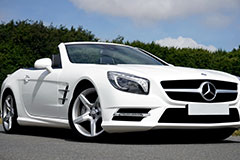Does the Car Color Affect the Fuel Consumption? - Vol.387
Few people realize that choosing a car's color can do more than just improve its looks. Why does this matter? Simply put, the color can affect your fuel efficiency because it contributes to how heat is distributed throughout the car.

Light Colors vs. Dark Colors
It doesn't take a rocket scientist to figure out that a color that doesn't attract much sunlight will help keep the car cooler. However, it did take some scientists to establish that there is a valid connection between choosing a reflective color like white or silver, instead of darker finishes, and saving energy.
If you don't own a convertible then you probably crank up the air conditioner in your car all summer long. Most people will probably take cold air over hot air while driving on any given occasion. It can get especially rough when your car stays parked in the sun for a couple of hours before you actually use it.
Black paint on a car will attract sunlight as black is the color that absorbs all light. During the summer time, this may prompt you to turn up the AC which makes the engine deliver more power to the air compressor. A light-colored vehicle will by no means stay cool on sunny days but it does reflect enough sunlight to make a difference.
Air-Conditioning and Heating Impact Fuel Consumption
While the air cooling system helps out on hot, sunny days, it doesn't come cheap. Air conditioning uses up engine power and often times can result in at least a 5% increase in fuel consumption. Some people choose to cool the interior by driving with the windows open.
That may work on city streets at low speeds but it doesn't help as much at higher speeds. The draft created when driving on a highway also creates a drag effect. In most cases this decreases the car's performance and increases fuel consumption more than the AC unit would.
You may be wondering, how is this related in any way to your choice of color? Choosing a more reflective color can keep the interior temperature at much as 9oF lower than what you would experience with a black coating. Because of this, you won't need to turn the AC up (as much to stay comfortable.
At the same time, a light reflective color can help you save fuel by running your AC at lower settings. This should still keep you comfortable without making a big dent in your monthly fuel budget.
However, during the winter you might prefer having a darker car. Whenever you get some sun in the area it will be attracted to the roof of your car. It won't save you much in terms of fuel consumption, but it will be a good extra source of heat. It all boils down to what you can handle best.
Do keep in mind that the color impacts fuel consumption more during hot sunny days than it does during cold seasons. There are many more factors that help you reduce fuel costs in the winter that make the choice of color almost negligible.
Conclusion
Choosing a light color for your car can affect fuel consumption efficiency by up to 2% on most vehicles. It reduces the strain on the AC unit by preventing the interior from heating up to extreme levels. This is not a great money saving strategy by any means, but it does help those who look to cut down costs wherever possible. It also helps reduce emissions. This is why eco-friendly cars come in lighter colors.